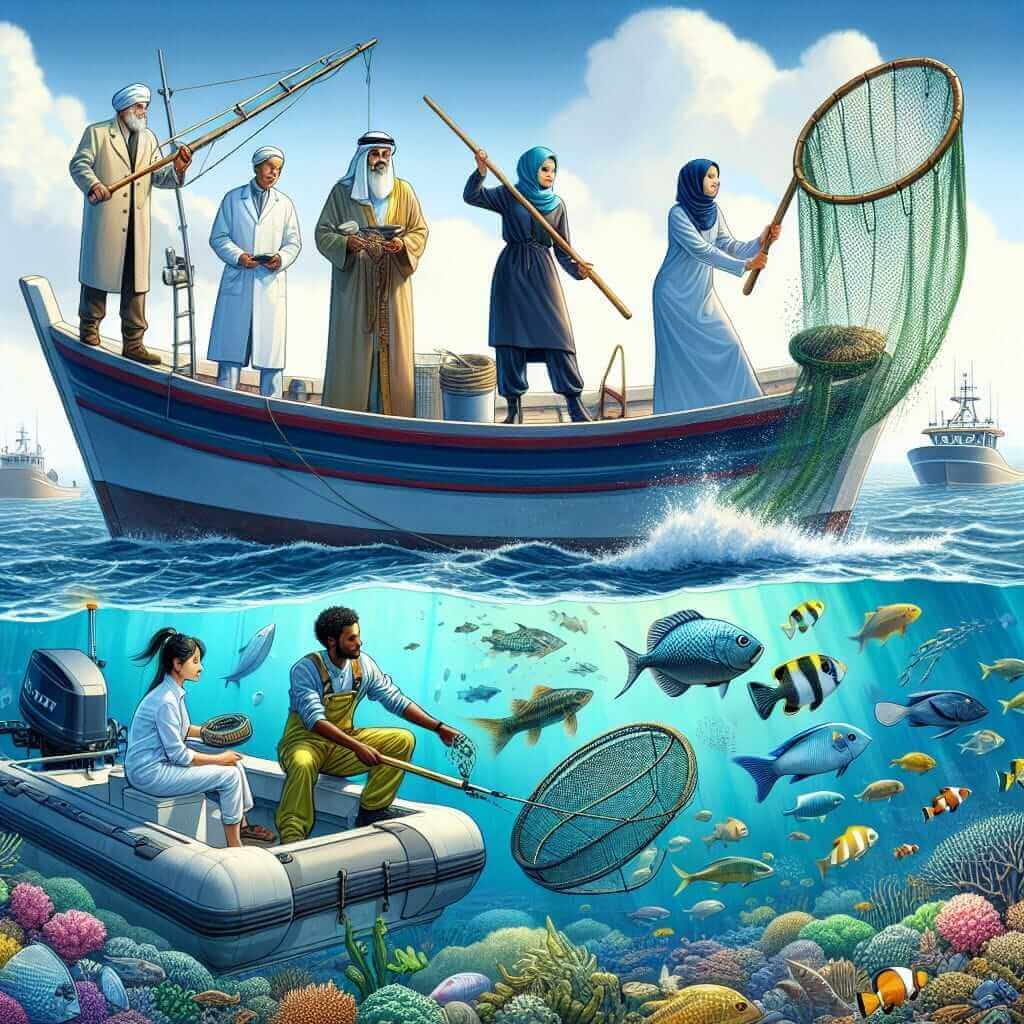The IELTS Reading section is crucial for achieving a high score in the IELTS exam. It tests your ability to comprehend and analyze texts on various subjects. One common topic you might encounter is the sustainability of fisheries. In the past, topics related to environmental sustainability and ecological impacts have frequently appeared, so understanding such topics can give you an edge. Given its relevance and persistence in global discourse, there’s a strong chance similar topics will appear in future exams.
Main Content
Sample Reading Passage: Medium Text
Achieving Sustainable Fisheries: Challenges and Solutions
Sustainable fisheries refer to fishing practices that maintain fish populations at healthy levels without compromising the ecosystem’s ability to replenish itself. While the concept is straightforward, achieving sustainable fisheries presents numerous challenges that must be addressed through concerted global efforts.
Firstly, overfishing remains a significant issue. This occurs when fish are caught at a rate faster than they can reproduce, leading to a depletion of fish stocks. Overfishing is driven by the increasing global demand for seafood and inadequate enforcement of fishing regulations. Countries often lack the necessary resources or political will to monitor and control their fishing activities effectively.
Secondly, bycatch or the unintentional capture of non-target species, poses another challenge. This practice not only affects the populations of these non-target species but also disrupts the balance of marine ecosystems. Innovative fishing gear and techniques are needed to minimize bycatch and reduce its impact on marine life.
Habitat destruction is another critical factor. Destructive fishing practices, such as bottom trawling, can devastate ocean habitats, including coral reefs and seagrass beds, which are crucial for the survival of many marine species. Preserving these habitats is essential for maintaining healthy fish populations and overall marine biodiversity.
Moreover, climate change exacerbates the challenges of sustainable fisheries. Rising sea temperatures and ocean acidification negatively affect fish habitats and reproductive cycles, making it more difficult for fish populations to recover from overfishing and other stresses.
Effective international cooperation and robust policy frameworks are imperative for sustainable fisheries. International agreements like the United Nations Convention on the Law of the Sea (UNCLOS) provide a legal foundation for managing fisheries resources. However, translating these agreements into actionable policies at regional and national levels remains challenging.
Lastly, consumer awareness and choice play a crucial role in promoting sustainable fisheries. By choosing sustainably sourced seafood, consumers can drive demand for responsible fishing practices. Education and awareness campaigns are necessary to inform the public about the importance of sustainable fisheries and how their choices can make a difference.
In conclusion, while the challenges to achieving sustainable fisheries are formidable, they are not insurmountable. Through collaborative efforts, innovative practices, and informed consumer choices, it is possible to ensure the sustainability of global fish stocks for future generations.

Sample Reading Questions
Multiple Choice Questions
-
What is the main cause of overfishing?
a. Climate change
b. Increasing global demand for seafood
c. Habitat destruction
d. Bycatch
-
Which practice is NOT mentioned as a threat to sustainable fisheries?
a. Overfishing
b. Climate change
c. Pollution
d. Habitat destruction
True/False/Not Given
-
Bycatch refers to the unintentional capture of non-target species.
a. True
b. False
c. Not Given
-
Consumer choices have no impact on sustainable fishing practices.
a. True
b. False
c. Not Given
Answer Keys
-
b. Increasing global demand for seafood
-
c. Pollution
-
a. True
-
b. False
Common Mistakes
- Overlooking keywords: Pay close attention to specific terms like “bycatch” and “habitat destruction” as they are crucial for understanding the text.
- Not distinguishing between similar options: In multiple-choice questions, there are usually options that are quite similar. Carefully read each option and go back to the text to ensure you choose the correct one.
Vocabulary
- Sustainable /səˈsteɪnəbl/ (adj): Using methods that do not cause harm to the environment.
- Overfishing /ˌoʊvərˈfɪʃɪŋ/ (n): Catching fish at a faster rate than they can reproduce.
- Bycatch /ˈbaɪˌkætʃ/ (n): Unintentional catch of non-target species while fishing.
- Habitat destruction /ˈhæbɪˌtæt dɪˈstrʌkʃən/ (n): The process of damaging aquatic habitats.
- Ecosystem /ˈiːkoʊˌsɪstəm/ (n): A community of interacting organisms and their environment.
Grammar Focus
- Passive Voice: Used to emphasize the action rather than the subject.
- Example: “Destructive fishing practices can devastate ocean habitats.”
- Present Continuous Tense: Often used in texts discussing ongoing issues.
- Example: “Countries are lacking the resources to monitor fishing activities.”
Advice for High IELTS Reading Score
- Practice Regularly: Consistent practice helps improve speed and comprehension.
- Understand Question Types: Familiarize yourself with different question formats.
- Improve Vocabulary: Enhance your understanding of academic terms and phrases.
- Read Widely: Read various texts on different subjects to build a broad understanding.
- Time Management: Practice under timed conditions to build efficiency.
- Use Other Resources: Explore related articles on topics such as how climate change impacts global fisheries for a broader understanding.
By following these strategies and integrating the insights from this guide, you’ll be better prepared to tackle the IELTS Reading section and aim for a high score.